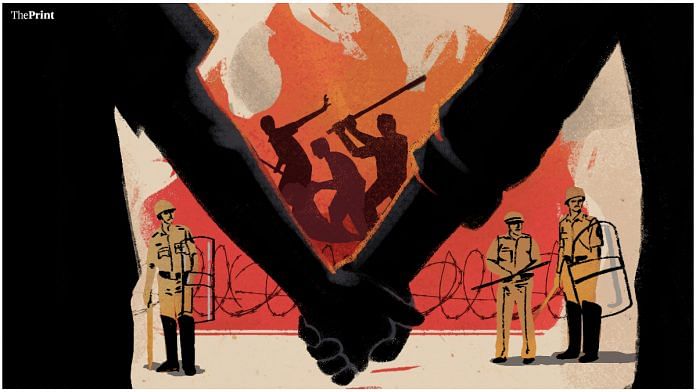It is hard to think of another time, post-Independence, when a Cabinet-ranked official would ask police officers to go to war against civil society. The only exception would be the period of Indira Gandhi’s Emergency rule. It is even harder to imagine another time, including the Emergency, when a four-star general from an army immersed in discipline would welcome the lynching of (presumably mob-identified) “terrorists”. That such statements can be made in all seriousness marks one of the transformations in India under Narendra Modi.
India has a long history of violence — by invaders and others. This was masked by the non-violent method that distinguished its freedom struggle, and then exposed by the killings that marked its culmination. There has been both systematised and episodic violence against Dalits, and violence in the mass evictions of powerless tribals from traditional habitats. These are complemented today by the casually cruel way in which the decimation of millions of jobs through damage to the informal sector of the economy is celebrated as the triumph of formalisation.
As in most societies, the violence is invariably by the strong against the weak, by people in uniform against the poorly clothed, by the majority against one or other kind of minority. And the state, which by definition is supposed to have a monopoly on violence, is the perpetrator or a cooperative by-stander. You could say the result is Darwinian, in a manner of speaking. But the old saying in Hindi captures it best: Jiski laathi, uski bhains (he who has the stick owns the buffalo).
Also read: 7.5 years of Modi: Good ‘output’ numbers like houses & toilets but not ‘outcomes’ like poverty
There is, however, a theory to parallel belief in the survival of the “fittest” — propounded last year by the husband-wife team of Brian Hare and Vanessa Woods. In Survival of the Friendliest: Understanding Our Origins and Rediscovering Our Common Humanity, they argue that Darwinian survival has to be seen alongside friendliness and the capacity for cooperative conduct, as it is these that have helped homo sapiens progress and prosper in comparison with our nearest evolutionary cousins. This is true for corporate culture, cricket teams, and individuals, just as much as for societies. For animals too: Hare and Woods are well known for an earlier book The Genius of Dogs: How Dogs Are Smarter Than You Think, in which they argued that a dog’s friendliness is a form of intelligence.
All this is relevant in an India where hate speech flourishes, where legislated and street violence can be unleashed against a chosen community, people who eat one kind of food, and those too weak to resist, or who just disagree. Relevant also because cooperative behaviour naturally has a dark side: People can cooperate within a group to attack the excluded — a lesson from the film Mississippi Burning. But such violence often comes up against a day of reckoning, especially if the institutional or moral breakdown that accompanies it creates a larger social dysfunctionality. America, for instance, is not a healthier or safer society because it has the largest number of people in prison relative to the population — with a disproportionate number in prison being non-White.
Sometimes, what was intended as uni-directional violence can explode in unintended directions. Manmohan Singh termed Maoist (essentially tribal) revolts the country’s biggest internal security problem. The Abdullahs of Kashmir did not expect pre-emptive imprisonment under the draconian law they had enacted. Nor did the Congress anticipate events when it wrote into the law books the Unlawful Activities (Prevention) Act, whose scope has broadened with the expansion of the definition of unlawful activities, and expansion also of the categories of officials who can take action under what is essentially a lawless law.
So it’s quite simple, really. The friendlier an open society is to all its residents, with people erasing dividing lines between the included and excluded, the better the results of such cooperative cohesiveness. And the more the presence of groups inclined to exclusionary conduct, lynching or uncivil war, the greater is the need for institutional bulwarks to ensure the survival of the friendliest, not the “fittest”.
By special arrangement with Business Standard
Also read: Modi, Yogi, Amarinder — why economic underperformers remain popular with voters



